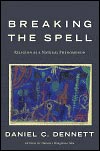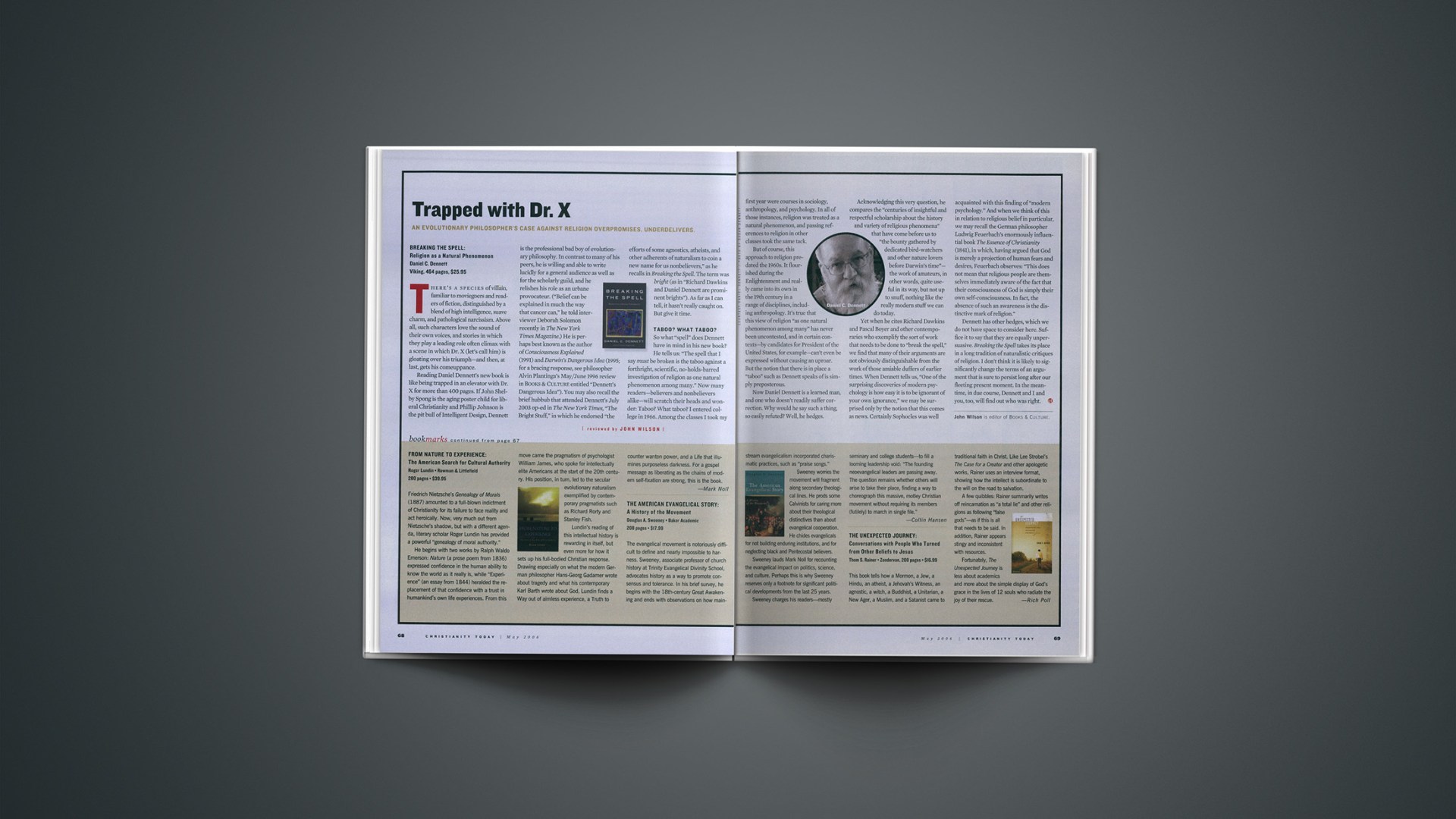There’s a species of villain, familiar to moviegoers and readers of fiction, distinguished by a blend of high intelligence, suave charm, and pathological narcissism. Above all, such characters love the sound of their own voices, and stories in which they play a leading role often climax with a scene in which Dr. X (let’s call him) is gloating over his triumph—and then, at last, gets his comeuppance.
 Breaking The Spell: Religion as aNatural Phenomenon by Daniel C. DennettViking464 pp.; $25.95 |
Reading Daniel Dennett’s new book is like being trapped in an elevator with Dr. X for more than 400 pages. If John Shelby Spong is the aging poster child for liberal Christianity and Phillip Johnson is the pit bull of Intelligent Design, Dennett is the professional bad boy of evolutionary philosophy. In contrast to many of his peers, he is willing and able to write lucidly for a general audience as well as for the scholarly guild, and he relishes his role as an urbane provocateur. (“Belief can be explained in much the way that cancer can,” he told interviewer Deborah Solomon recently in The New York Times Magazine.) He is perhaps best known as the author of Consciousness Explained (1991) and Darwin’s Dangerous Idea (1995); for a bracing response, see philosopher Alvin Plantinga’s May/June 1996 review in Books & Culture entitled “Dennett’s Dangerous Idea”. You may also recall the brief hubbub that attended Dennett’s July 2003 op-ed in The New York Times, “The Bright Stuff,” in which he endorsed “the efforts of some agnostics, atheists, and other adherents of naturalism to coin a new name for us nonbelievers,” as he recalls in Breaking the Spell. The term was bright (as in “Richard Dawkins and Daniel Dennett are prominent brights”). As far as I can tell, it hasn’t really caught on. But give it time.
Taboo? What Taboo?
So what “spell” does Dennett have in mind in his new book? He tells us: “The spell that I say must be broken is the taboo against a forthright, scientific, no-holds-barred investigation of religion as one natural phenomenon among many.” Now many readers—believers and nonbelievers alike—will scratch their heads and wonder: Taboo? What taboo? I entered college in 1966. Among the classes I took my first year were courses in sociology, anthropology, and psychology. In all of those instances, religion was treated as a natural phenomenon, and passing references to religion in other classes took the same tack.
But of course, this approach to religion predated the 1960s. It flourished during the Enlightenment and really came into its own in the 19th century in a range of disciplines, including anthropology. It’s true that this view of religion “as one natural phenomenon among many” has never been uncontested, and in certain contexts—by candidates for President of the United States, for example—can’t even be expressed without causing an uproar. But the notion that there is in place a “taboo” such as Dennett speaks of is simply preposterous.
Now Daniel Dennett is a learned man, and one who doesn’t readily suffer correction. Why would he say such a thing, so easily refuted? Well, he hedges.
Acknowledging this very question, he compares the “centuries of insightful and respectful scholarship about the history and variety of religious phenomena” that have come before us to “the bounty gathered by dedicated bird-watchers and other nature lovers before Darwin’s time”—the work of amateurs, in other words, quite useful in its way, but not up to snuff, nothing like the really modern stuff we can do today.
Yet when he cites Richard Dawkins and Pascal Boyer and other contemporaries who exemplify the sort of work that needs to be done to “break the spell,” we find that many of their arguments are not obviously distinguishable from the work of those amiable duffers of earlier times. When Dennett tells us, “One of the surprising discoveries of modern psychology is how easy it is to be ignorant of your own ignorance,” we may be surprised only by the notion that this comes as news. Certainly Sophocles was well acquainted with this finding of “modern psychology.” And when we think of this in relation to religious belief in particular, we may recall the German philosopher Ludwig Feuerbach’s enormously influential book The Essence of Christianity (1841), in which, having argued that God is merely a projection of human fears and desires, Feuerbach observes: “This does not mean that religious people are themselves immediately aware of the fact that their consciousness of God is simply their own self-consciousness. In fact, the absence of such an awareness is the distinctive mark of religion.”
Dennett has other hedges, which we do not have space to consider here. Suffice it to say that they are equally unpersuasive. Breaking the Spell takes its place in a long tradition of naturalistic critiques of religion. I don’t think it is likely to significantly change the terms of an argument that is sure to persist long after our fleeting present moment. In the meantime, in due course, Dennett and I and you, too, will find out who was right.
John Wilson is editor of Books & Culture.
Copyright © 2006 Christianity Today. Click for reprint information.
Related Elsewhere:
Breaking the Spell is available from Amazon.com and other book retailers.
More articles about atheism are available on our site:
The Twilight of Atheism | Why this once exciting and ‘liberating’ philosophy failed to capture the world’s imagination. (Feb. 28 2005)
Weblog: Atheist No More, Flew Still Rejects Revelation | Antony Flew: Science pretty much proves God’s existence (Dec. 10, 2004)
Forced by Logic | It took philosophy and a friend to convince this atheist. (June 13, 2003)
Perestroika of the Spirit | In Russia, the vocabulary of faith needs interpreters. (March 05, 2003)
Albania’s journey from atheism to model of religious growth | Albania, which in 1967 became the world’s first official atheistic state, is now fast becoming a model of religious growth and an example to the rest of Europe, according to a senior Orthodox official. (Nov. 29, 1999)
Russian Intellectuals Try to Revive Atheism | The Moscow Society of Atheists says its ideology has fallen out of fashion. (Jan. 24, 2001)
More articles on faith and secularism include:
That Other Church | Let’s face it: Secularism is a religion. Let’s treat it as such. (Dec. 21, 2004)
Misfires in the Tolerance Wars | Separating church and state now means separating belief and action. (Feb. 24, 2004)
One Nation Under Secularism | France’s peculiar aversion to public religiosity is rooted in a sordid history of sectarian violence. (Feb. 13, 2004)
A Secularist Jihad | Fundamentalist has become a rhetorical weapon of mass destruction.—A Christianity Today Editorial (Jan. 2, 2002)
Tanks at the Manger | Some would like to forget that Christmas—and religion in general—has political significance. (Jan. 2, 2002)
Zarathustra Shrugged | What apologetics should look like in a skeptical age. (Sept. 5, 2001)
In 2002, Books & Culture devoted an issue to the theme God is not dead:
In 1996, Books & Culture published a three part series on Richard Dawkins and Philip Johnson.










